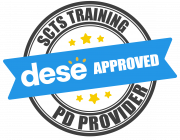The success of students with disabilities hinges on the effectiveness of their Individualized Education Programs (IEPs). These programs are essential in providing tailored educational experiences that meet the unique needs of each student. However, the IEP process is complex, involving collaboration among special educators, general educators, district leaders, and parents. Given the varied roles and responsibilities of these stakeholders, one-size-fits-all training is insufficient. Instead, specialized IEP training is necessary to ensure that everyone involved is equipped with the knowledge and skills needed to contribute effectively to the IEP process. In this blog post, we will explore the importance of having specialized IEP training for different educators, district leaders, and parents, and how SCTS Training offers five courses designed to meet these diverse needs.
The Need for Specialized IEP Training:
IEP teams are composed of individuals with different roles, each bringing a unique perspective to the table. Special educators are the experts in creating and implementing IEPs, while general educators play a crucial role in integrating IEP strategies into the general education classroom. District leaders are responsible for ensuring compliance with state and federal regulations, and parents provide invaluable insights into their child’s needs and advocate for their best interests. Given these varied responsibilities, specialized training is essential to ensure that each member of the IEP team is well-prepared and able to contribute effectively.
Specialized IEP training is important for several reasons:
- Role-Specific Knowledge: Different roles within the IEP team require different knowledge and skills. For example, special educators need to be well-versed in writing detailed IEPs, while general educators need to understand how to implement these plans in their classrooms. District leaders must focus on compliance and overall program effectiveness, and parents need to be informed participants in the process. Specialized training ensures that each group receives the information and skills they need to fulfill their specific roles effectively.
- Enhanced Collaboration: When each member of the IEP team is properly trained, collaboration becomes more effective. Specialized training ensures that all stakeholders have a clear understanding of their roles and how they fit into the larger IEP process. This shared understanding fosters better communication and teamwork, leading to more effective IEPs and better outcomes for students.
- Compliance and Legal Considerations: The IEP process is governed by a complex web of state and federal regulations. District leaders and educators must be well-versed in these laws to ensure compliance and avoid potential legal issues. Specialized training provides the necessary knowledge to navigate these regulations and create legally sound IEPs.
- Parent Empowerment: Parents are critical members of the IEP team, but many feel overwhelmed by the complexity of the process. Specialized training for parents empowers them to participate more fully in the IEP process, ensuring that their voices are heard and that they can advocate effectively for their child’s needs.
SCTS Training’s 5 Specialized IEP Training Courses:
SCTS Training recognizes the importance of specialized IEP training and offers five courses designed to meet the needs of different stakeholders in the IEP process. Each course is tailored to the unique responsibilities and challenges faced by its target audience, ensuring that participants receive the most relevant and effective training possible.
- The New Massachusetts IEP Training: 2001 to Present
- Target Audience: Experienced educators familiar with the 2001 IEP requirements.
- Course Overview: This course is specifically designed for educators who have experience with the 2001 IEP requirements and need to transition to the new Massachusetts IEP framework. The course includes crosswalk documentation that maps sections of the 2001 IEP to the new IEP, helping educators understand the changes and how to implement them effectively. Additionally, it provides resources and references to the 2001 requirements, ensuring that educators can make informed decisions while transitioning to the new system.
- Importance: This course is essential for ensuring that experienced educators do not feel lost or overwhelmed by the new requirements. By providing a clear comparison between the old and new frameworks, SCTS ensures that educators can smoothly transition their practices to align with the updated standards, ultimately benefiting the students they serve.
- Foundations of the Massachusetts IEP Process
- Target Audience: Educators who have not had previous IEP experience.
- Course Overview: Designed for educators who are new to the IEP process, this course provides a comprehensive introduction to the new Massachusetts IEP requirements. Participants will learn the fundamentals of developing and implementing IEPs, from understanding legal requirements to writing effective goals and objectives. The course also covers best practices for collaborating with other members of the IEP team and engaging with parents.
- Importance: For new educators, understanding the IEP process from the ground up is critical. This course ensures that new educators start their careers with a strong foundation in IEP development and implementation, enabling them to provide the best possible support to students with disabilities from the very beginning.
- IEP Training for General Educators
- Target Audience: General educators who work with students with IEPs.
- Course Overview: General educators play a vital role in the IEP process by implementing accommodations and modifications in the general education classroom. This course provides high-level information about the IEP process and the role of general educators within it. Participants will learn how to collaborate with special educators, monitor student progress, and ensure that IEP goals are being met in their classrooms.
- Importance: General educators are often the first to notice when a student with an IEP is struggling or thriving. By equipping them with the knowledge and skills to participate effectively in the IEP process, this course ensures that general educators can contribute meaningfully to the success of students with disabilities. It also emphasizes the importance of progress monitoring, helping general educators track student progress and make necessary adjustments to instruction.
- IEP Training for District Leaders
- Target Audience: District leaders and administrators responsible for overseeing IEP implementation.
- Course Overview: District leaders have a critical role in ensuring that IEP teams are coherent, compliant, and effective. This course focuses on the key concepts and regulations that district leaders need to know to oversee the IEP process effectively. Participants will learn how to ensure that IEP teams are functioning well, that IEPs are being implemented correctly, and that the district is in compliance with state and federal regulations.
- Importance: District leaders are responsible for the overall success of the IEP process within their schools. This course ensures that they have the knowledge and skills to provide the necessary oversight and support, leading to better outcomes for students and fewer compliance issues for the district.
- IEP Training for Parents
- Target Audience: parents of students with IEPs.
- Course Overview: This course is designed to help educators lead group learning sessions for parents of students with IEPs. The course focuses on preparing parents to be integral parts of the IEP process by providing them with resources and information ahead of the IEP meeting. It also covers how parents can help ensure the long-term success of their child’s education, both during and after the IEP process.
- Importance: Parents are essential partners in the IEP process, but many feel unprepared to participate effectively. This course empowers educators to provide parents with the knowledge and confidence they need to advocate for their child’s needs. By fostering better communication and collaboration between parents and educators, this course helps ensure that IEPs are truly individualized and aligned with the student’s needs and goals.
Conclusion:
Specialized IEP training is essential for ensuring that all members of the IEP team—educators, district leaders, and parents—are well-equipped to fulfill their roles effectively. Each member of the team brings unique knowledge and perspectives to the table, and specialized training helps them leverage these strengths to create the most effective IEPs possible. SCTS Training offers five specialized courses designed to meet the needs of different stakeholders in the IEP process, providing them with the knowledge, skills, and confidence they need to support students with disabilities effectively.
By investing in specialized IEP training, Massachusetts school districts can ensure that their teams are not only compliant with state and federal regulations but also capable of delivering high-quality, individualized education to all students. Whether it’s helping experienced educators transition to new requirements, guiding new educators through the fundamentals, empowering general educators to play an active role, supporting district leaders in their oversight responsibilities, or preparing parents to be strong advocates, SCTS Training has the right course for every need. In the end, the true beneficiaries of this specialized training are the students, who receive the tailored support they need to succeed both academically and personally.







